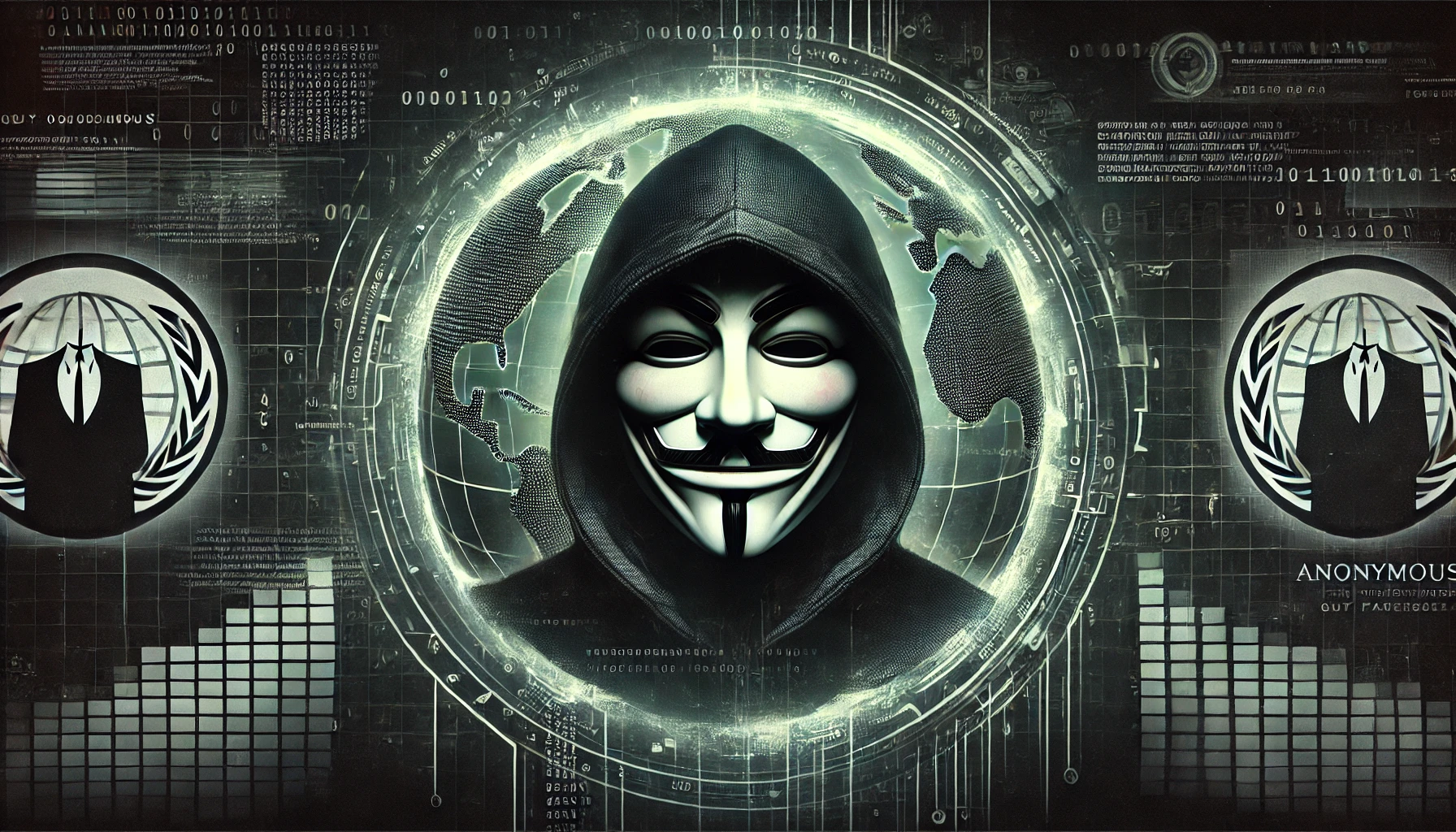
What is Anonymous?
Anonymous is a decentralized international activist and hacktivist collective and movement, widely known for its various cyber attacks against several governments, institutions, and corporations. Emerging in the early 2000s on the imageboard 4chan, Anonymous initially represented a form of decentralized online community. Over time, it evolved into a significant socio-political force, leveraging the power of the internet to advocate for free speech, privacy, and the exposure of corruption.
Origins and Ideology
Anonymous originated in the early 2000s on the imageboard 4chan, a place known for its irreverent and anarchic culture. Initially, Anonymous was more of a concept than a group, representing the collective actions of users who would often coordinate for humorous or disruptive purposes. These actions were not initially driven by a coherent ideology but were more about trolling and pranking. Over time, however, the collective began to coalesce around shared values and causes, leading to more organized and politically motivated actions.
The name "Anonymous" reflects the group's emphasis on anonymity. This was both a tactical choice and an ideological stance. By operating without identifiable leaders, Anonymous aimed to avoid the pitfalls of hierarchical structures that could be targeted or corrupted. The Guy Fawkes mask, popularized by the graphic novel and film "V for Vendetta," became a symbol of their identity. It represents the idea that anyone can be part of the movement, embodying the notion of collective power over individual leadership.
The ideology of Anonymous is inherently fluid due to its decentralized nature. However, certain core principles are evident. These include a commitment to freedom of information, resistance to censorship, and opposition to corruption and abuse of power. These principles have guided their actions against various targets, from government institutions to corporations. The lack of a formal structure allows members to engage in actions that align with their personal beliefs while still being part of the broader movement. This flexibility is a double-edged sword, as it allows for a wide range of activities but also makes it difficult to maintain a consistent ethical framework.
Notable Operations and Impact
Anonymous has been involved in numerous high-profile operations, each reflecting the group's core tenets of challenging censorship and exposing corruption. These operations have often had significant socio-political impacts, both positive and negative.
Project Chanology (2008)One of the first major operations that brought Anonymous into the public eye was Project Chanology, launched in 2008 against the Church of Scientology. The campaign began after the Church attempted to censor a leaked internal video featuring Tom Cruise discussing his Scientology beliefs. Anonymous viewed this as an attack on free speech and responded with a coordinated effort that included DDoS attacks on Scientology websites, prank calls, and black faxes (sending entirely black pages to waste toner). They also organized real-world protests, with thousands of people donning Guy Fawkes masks and picketing Scientology centers worldwide. This operation highlighted Anonymous' ability to mobilize both online and offline activism, marking a significant shift from digital pranks to targeted socio-political actions.
Operation Payback (2010)Operation Payback began as a response to anti-piracy groups but quickly shifted focus to support WikiLeaks and Julian Assange. After WikiLeaks released a trove of US diplomatic cables, financial institutions like PayPal, Visa, and MasterCard stopped processing donations to the organization. Anonymous retaliated with DDoS attacks, temporarily disabling the websites of these institutions. This operation underscored Anonymous' stance on internet freedom and financial censorship, drawing global attention to the issues at stake. It also demonstrated the group's capacity to challenge powerful entities and disrupt their operations, reinforcing their role as a digital vigilante force.
Arab Spring (2011)During the Arab Spring, Anonymous played a crucial role in supporting revolutionary movements across the Middle East and North Africa. In countries like Tunisia and Egypt, where governments attempted to suppress dissent through internet censorship and surveillance, Anonymous provided activists with tools to bypass these restrictions. They launched cyber attacks on government websites, leaking confidential documents and defacing pages with messages of support for the protesters. By amplifying the voices of those fighting against oppressive regimes, Anonymous demonstrated the potential of cyber activism to influence real-world events and support democratic movements.
Operation Sony (2011)In 2011, Sony's legal actions against individuals who jailbroke PlayStation 3 consoles sparked Operation Sony. Anonymous viewed this as an infringement on consumer rights and digital freedom. They launched a series of DDoS attacks on Sony's online infrastructure, including the PlayStation Network, which led to a significant disruption of services for millions of users. This operation highlighted the tension between corporate control and consumer rights in the digital age. It also showcased Anonymous' willingness to leverage their technical skills to challenge corporate actions perceived as overreach.
Operation Darknet (2011)Operation Darknet targeted illegal activities on the dark web, specifically child pornography. Anonymous identified and attacked websites hosting such content, releasing information about users and operators to law enforcement. This operation demonstrated the collective's willingness to engage in vigilantism, using their hacking skills to combat egregious criminal activities. While controversial, this action was widely praised for addressing a serious societal issue. It also highlighted the ethical complexities of Anonymous' operations, balancing their anti-establishment stance with actions aimed at protecting vulnerable populations.
Operation AntiSec (2011)Operation AntiSec, a collaboration between Anonymous and the hacker group LulzSec, aimed to expose security flaws in various government, corporate, and media websites. High-profile targets included the CIA, Sony, and the Arizona Department of Public Safety. The operation involved leaking confidential data to underscore the vulnerability of even the most secure systems. This campaign brought attention to issues of cybersecurity and privacy, emphasizing the need for robust digital defenses. It also reinforced Anonymous' reputation as a formidable force in the realm of hacking and cyber activism.
Steubenville Rape Case (2012-2013)In the Steubenville rape case, Anonymous intervened by releasing incriminating evidence that local authorities were accused of covering up. Videos, social media posts, and other evidence showing the involvement of high school football players in the rape of a teenage girl were made public. This operation, dubbed Operation Roll Red Roll, led to national outrage, legal action against the perpetrators, and discussions about rape culture and the influence of sports on justice. It highlighted Anonymous' role in seeking justice for victims and challenging systemic failures.
Operation Ferguson (2014)Following the shooting of Michael Brown in Ferguson, Missouri, Anonymous launched Operation Ferguson to support protests against police brutality. They leaked information about the Ferguson police department, including the name of the officer involved in the shooting (though this information was initially incorrect). Anonymous also coordinated cyber attacks on municipal websites and disseminated information to help protesters organize. This operation underscored Anonymous' commitment to social justice and their willingness to intervene in high-profile cases of perceived injustice.
Operation Icarus (2016)Operation Icarus targeted the global banking system, launching DDoS attacks on major financial institutions like the Bank of Greece, the Central Bank of Cyprus, and the World Bank. The operation aimed to protest against economic inequality and corruption, highlighting the influence of financial institutions on global economics and politics. By disrupting these entities, Anonymous sought to draw attention to issues of financial power and its impact on ordinary people. This operation illustrated the group's broadening scope, from individual incidents to systemic critiques of global institutions.
George Floyd Protests (2020)Amid the global protests following George Floyd's death, Anonymous resurfaced with renewed vigor. They targeted police departments and government websites, releasing documents alleging police misconduct and corruption. The Minneapolis Police Department's website was taken down, and other official channels were disrupted to draw attention to systemic racism and police brutality. This operation aligned with Anonymous' long-standing commitment to social justice, using cyber activism to support the broader movement for racial equality and police reform.
Controversies and Criticisms
Anonymous' methods and decentralized structure have led to significant controversies and criticisms. While the collective is often praised for challenging corruption and supporting freedom of information, their actions frequently border on illegal activities, raising ethical and legal concerns.
One of the primary criticisms is the group's use of DDoS attacks, hacking, and data leaks, which are illegal in many jurisdictions. Critics argue that such methods undermine the group's moral stance and can result in collateral damage. For instance, DDoS attacks on financial institutions or government websites can disrupt services for ordinary people, causing unintended harm. Moreover, the release of confidential data can lead to privacy violations, affecting innocent individuals.
The lack of accountability within Anonymous is another major concern. The group's decentralized nature means that anyone can claim to be part of Anonymous, leading to actions that may not align with the collective's purported ethical framework. This can result in poorly planned or executed operations with unintended consequences. For example, during Operation Ferguson, Anonymous incorrectly identified the police officer involved in Michael Brown's shooting, which could have led to significant harm to an innocent individual.
Additionally, the anonymity that protects Anonymous members also shields those who may act out of personal vendettas rather than genuine activism. This has led to instances where actions attributed to Anonymous were later found to be driven by personal grudges rather than collective decision-making. The decentralized structure also makes it difficult to differentiate between genuine Anonymous operations and those carried out by opportunistic individuals or groups.
Despite these criticisms, Anonymous has had a significant impact on global events and the discourse around internet freedom, privacy, and social justice. Their actions have brought attention to critical issues, from government corruption to corporate overreach, and have demonstrated the power of collective cyber activism. However, the ethical ambiguity and potential for misuse inherent in their structure continue to provoke debate about the legitimacy and effectiveness of their methods.
Conclusion
Anonymous remains a complex and multifaceted entity within the landscape of digital activism. Its impact on global events and the discourse around internet freedom and privacy cannot be underestimated. The collective's ability to mobilize both online and offline actions has demonstrated the potential of cyber activism to influence real-world outcomes and support democratic movements.
However, the ethical ambiguity and potential for misuse inherent in Anonymous' structure continue to provoke debate. The group's decentralized nature allows for a wide range of actions but also makes it challenging to maintain a consistent ethical framework. The anonymity that protects members also shields those who may act out of personal vendettas, leading to unintended consequences and ethical dilemmas.
As digital landscapes evolve, so too will the methods and influence of Anonymous. The rise of new technologies and the increasing importance of the internet in everyday life will provide both opportunities and challenges for the collective. While their actions may continue to provoke controversy, Anonymous' commitment to challenging censorship, exposing

